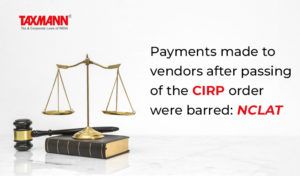Payments made to vendors after passing of the CIRP order were barred: NCLAT
- Blog|News|Insolvency and Bankruptcy Code|
- 2 Min Read
- By Taxmann
- |
- Last Updated on 18 May, 2022

Case Details: PJ Network (P.) Ltd. v. Pardeep Kumar Lakhani, Resolution Professional of Dion Global Solutions Ltd. - [2022] 138 taxmann.com 29 (NCL-AT)
Judiciary and Counsel Details
-
- Anant Bijay Singh, Judicial Member & MS. Shreesha Merla, Technical Member
- Kaushal Bansal, Adv. for the Respondent.
Facts of the Case
In the instant case, the respondent-IRP took over the affairs of the corporate debtor in terms of section 17 and CIRP Regulations. He, on perusal of the bank account of the corporate debtor, found that even before he took charge of the corporate debtor certain payments had been made by employees of the corporate debtor to vendors/appellants for the services availed by the corporate debtor prior to the CIRP period.
The respondent immediately filed the application under section 60 before the Adjudicating Authority in order to recover said amount illegally transferred to vendors.
The Adjudicating Authority allowed application holding that in terms of section 14(1), corporate debtor or its management or agents cease to exist and only IRP is in control after initiation of CIRP of the corporate debtor. The Adjudicating Authority directed appellant vendors to refund all amount in the account of the corporate debtor under the control of IRP/respondent.
On appeal, it was contended that the appellant was rendering essential services, i.e., ‘Information Technology Services’ and the payments for essential services were an exception to the general moratorium as they fell under section 14(2).
NCLAT Held
The Appellate Tribunal held that since the appellant had not taken plea of section 14(2) before Adjudicating Authority, the issue of whether services rendered by the appellant fell under essential services or not could not be considered at this stage. It was further observed that since all payments were made after CIRP was initiated against the corporate debtor, Adjudicating Authority had rightly ordered to refund all payments received by the appellant.
List of Cases Reviewed
-
- Pardeep Kumar Lakhani, RP of Dion Global Solutions Ltd. v. PJ Networks (P.) Ltd. [2022] 138 taxmann.com 28 (NCLT-New Delhi) (para 17) affirmed [See Annex].
List of Cases Referred to
-
- Dakshin Gujarat VIJ Co. Ltd. v. ABG Shipyard Ltd. [2018] 93 taxmann.com 384 (NCL-AT) (para 8)
- M. Ravindranath Reddy v. G. Kishan [2020] 113 taxmann.com 526 (NCL-AT) (para 13)
- Mykind Vacations (P.) Ltd. v. Dion Global Solutions Ltd. [2020] 120 taxmann.com 179/162 SCL 382 (NCLT – New Delhi) (para 16).
Disclaimer: The content/information published on the website is only for general information of the user and shall not be construed as legal advice. While the Taxmann has exercised reasonable efforts to ensure the veracity of information/content published, Taxmann shall be under no liability in any manner whatsoever for incorrect information, if any.

Taxmann Publications has a dedicated in-house Research & Editorial Team. This team consists of a team of Chartered Accountants, Company Secretaries, and Lawyers. This team works under the guidance and supervision of editor-in-chief Mr Rakesh Bhargava.
The Research and Editorial Team is responsible for developing reliable and accurate content for the readers. The team follows the six-sigma approach to achieve the benchmark of zero error in its publications and research platforms. The team ensures that the following publication guidelines are thoroughly followed while developing the content:
- The statutory material is obtained only from the authorized and reliable sources
- All the latest developments in the judicial and legislative fields are covered
- Prepare the analytical write-ups on current, controversial, and important issues to help the readers to understand the concept and its implications
- Every content published by Taxmann is complete, accurate and lucid
- All evidence-based statements are supported with proper reference to Section, Circular No., Notification No. or citations
- The golden rules of grammar, style and consistency are thoroughly followed
- Font and size that’s easy to read and remain consistent across all imprint and digital publications are applied



 CA | CS | CMA
CA | CS | CMA
